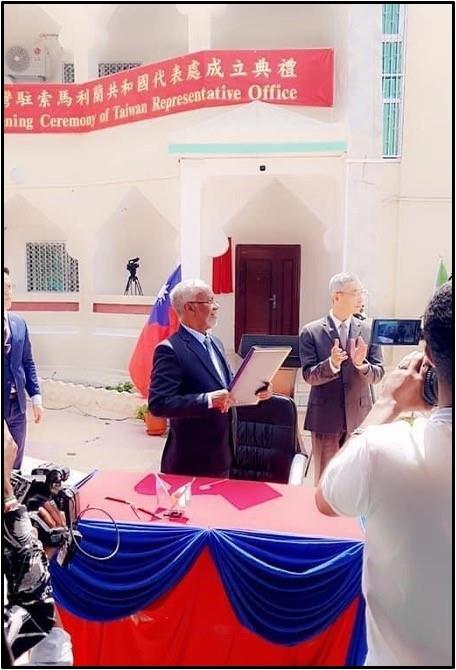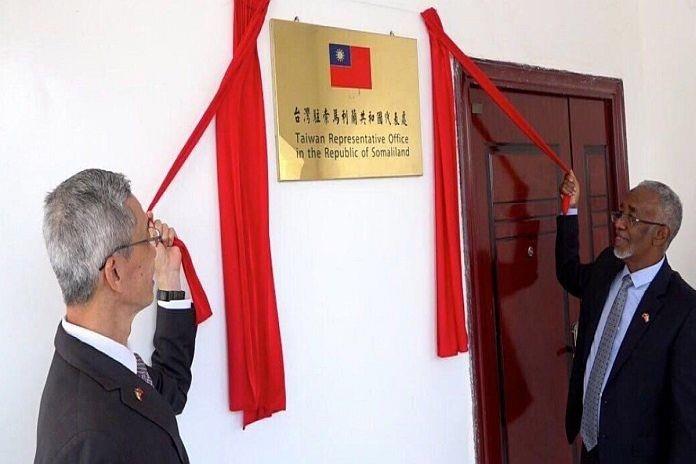
The Taiwan-Somaliland partnership: A model for an unofficial approach to diplomatic relations?
By Marshall Reid
In the wake of the Republic of Kiribati's 2019 decision to switch diplomatic recognition from the Republic of China (ROC, Taiwan) to the People's Republic of China (PRC), a wide range of commentators expressed concerns about the island's shrinking international space. While such worries are certainly valid, Taiwan has been reduced to a mere 15 full diplomatic allies , mostly consisting of small, island nations.Taipei has nevertheless proven itself capable of expanding its diplomatic space through more limited, unofficial relationships.
This alternative approach to diplomatic partnerships has perhaps best been exemplified by Taiwan's burgeoning relationship with the Republic of Somaliland. Since February 2020, when Taipei and Hargeisa signed an agreement allowing for the exchange of representative offices, ties between the two isolated republics have flourished. Despite considerable Chinese pressure and a challenging international environment, Taiwan and Somaliland have nevertheless managed to forge a productive partnership. In doing so, they may have both uncovered an alternative path toward broader international acceptance.
Contrasting collaborators
Separated by thousands of miles and possessing vastly different cultures, histories, and economies, Taiwan and Somaliland appear to have little in common. In spite of these contrasts, Taiwan and Somaliland have several notable parallels. Like Taiwan, Somaliland emerged in the aftermath of a devastating civil war, the ramifications of which continue to shape the nation's political status. Since its declaration of independence from Somalia in 1991, Hargeisa has followed a path similar to that of Taipei, working to secure its existence in the shadow of a dangerous neighbor determined to absorb it.
While both Taiwan and Somaliland have proven relatively successful in this pursuit, they have nevertheless found themselves in difficult international positions. Excluded from the vast majority of international institutions and largely unrecognized by the global community, the two nations have been forced to accept de facto independence. Nevertheless, both Taipei and Hargeisa have become active participants in global affairs, consistently working on the periphery to secure what little cooperation they can.
In addition to these geopolitical similarities, Taiwan and Somaliland share a commitment to democratic values and political freedom. Speaking at the opening of Somaliland's representative office in Taiwan, Chief Representative Mohamed Omar Hagi Mohamoud stated that the partnership between the two nations was“based on common values of freedom and democracy.” While Somaliland's democracy remains traditional and clan-based , it is nevertheless among the most stable and open in its region. Given Taiwan's long-standing commitment to defending democratic values, both domestically and internationally, Somaliland is a natural partner.
Though the announcement of the mutual establishment of representative offices between Taiwan and Somaliland arrived somewhat suddenly in early 2020, the decision was the culmination of over a decade of growing cooperation between the two states. In 2009, Taipei and Hargeisa announced an agreement to expand ties , with a particular emphasis on education, healthcare, and maritime security. Over the ensuing years, this agreement has resulted in a range of substantive collaborations , including educational exchanges , medical consultations , and capacity building exercises . This has also included a recent Taiwanese shipment of COVID-19 personal protective equipment (PPE) to Somaliland.
Such cooperative efforts have proliferated following the exchange of representative offices, with a wide range of agreements and memoranda of understanding (MOUs) signed over the past two years. While the partnership remains strictly unofficial – the two countries exclusively refer to their offices as“representative offices” rather than“embassies” – it has clearly provided a framework for substantial cooperation between the two sides.
Needless to say, this expanded relationship has not been well received by the PRC, with Foreign Ministry Spokesman Zhao Lijian (趙立堅) stating that those who challenge the“One-China Principle”“will get burned and swallow the bitter fruit.” This sentiment was echoed by the Republic of Somalia, which has condemned the partnership as an attempt to“violate its territorial integrity.” Thus far, however, this pressure has done little to deter Taipei and Hargeisa, who have continually reaffirmed their commitment to one another.
While the Taiwan-Somaliland partnership remains limited in scope thus far, it nevertheless represents a significant opportunity for both parties. For Hargeisa, Taiwan could serve as a“big brother ,” helping Somaliland to consolidate its young democracy and develop its untapped natural resources. For Taipei, Somaliland could serve as a crucial foothold for expanding diplomatic contacts and exerting economic influence in the Horn of Africa, a region long dominated by the PRC . Perhaps more importantly, however, the relationship could provide Taiwan with a template for future, unofficial ties with other like-minded democracies.

The opening ceremony for the Taiwan Representative Office in Somaliland's capital city of Hargeisa, August 17, 2020. (Image source: Somaliland Standard)
A preoccupation with official relations
For decades, discussions of Taiwan's international space have focused heavily on Taipei's shrinking list of official diplomatic partners. As the PRC has steadily peeled away diplomatic partners one after another, commentators both within Taiwan and internationally have lamented the island nation's declining international position, framing each loss as an erosion of the ROC's hard-fought legitimacy. Driven by such fears, Taiwan's government has routinely gone to excessive lengths to prevent its diplomatic partners from defecting.
During the administration of Chen Shui-bian (陳水扁), these efforts, in the extreme, took the form of“checkbook diplomacy” as Taiwan resorted to providing partner governments with larger sums of funding than Beijing would offer in order to keep them on Taipei's side.
As GTI Research Fellow I-wei Jennifer Chang pointed out in the last issue of the Global Taiwan Brief , such tactics have had mixed results, as Taipei has typically been unable to effectively outbid Beijing. While the Tsai Ing-wen (蔡英文) Administration has largely moved away from engaging in funding competitions with the PRC, it has continued to provide funding and infrastructure investment to its remaining partners. In spite of this, Taipei has continued to lose partners, with seven nations switching recognition since Tsai's election in 2016. Increasingly, it seems that Taipei is fighting a losing battle.
As it currently stands, Taiwan's government attaches a great deal of importance to maintaining official relations with its diplomatic allies – a factor it perceives as critical to preserving its sovereignty on the global stage. As a 2020 public opinion survey has shown, this sentiment is shared by a substantial portion of Taiwan's population, particularly when maintaining such relations is framed as an act of defiance against the PRC.
However, the same survey also found that public support for preserving formal relationships plummets when maintaining ties is framed in terms of providing extra funding and resources to partners. As such, it seems that the Taiwan public's support for preserving formal alliances is primarily motivated by a desire to resist Chinese pressure, rather than a desire to bankroll smaller nations around the world.
Conclusions
While concerns over Beijing's poaching of Taiwan's official diplomatic partners are certainly worthy of consideration, Taipei has proven that it is capable of surviving and thriving in the absence of formal recognition. As its growing relationship with Somaliland has demonstrated, Taiwan has found a path towards achieving international cooperation without formal ties. With this in mind, the Tsai Administration should consider reallocating diplomatic funding and efforts towards more productive, unofficial relationships.
Currently, Taiwan maintains limited, unofficial ties with a wide range of nations around the world. In many cases, this consists of little more than a representative office, typically staffed by a small contingent of diplomats and cultural attachés. Despite these limitations, these offices could serve as foundations for more expansive, unofficial relationships in the future. This arrangement has been clearly demonstrated by the Taiwan-Somaliland partnership, as the exchange of small representative offices rapidly expanded into a more substantial diplomatic, economic, and cultural relationship.
Another instance of this model appears to be taking shape in Lithuania, where representative offices have laid the groundwork for more concrete cooperation. In both cases, Taiwan has been able to secure strong, productive partnerships despite the absence of formal recognition from its counterpart. This suggests that such a strategy could potentially be effective in other contexts.
As previously mentioned, Taiwan's public has long associated formal diplomatic relations with resistance or even competition against China. While this is unlikely to change, Taipei would be well-served by shifting its messaging toward unofficial partnerships. Already, Taiwan's unofficial relationships, particularly those with the United States and Japan – play a far greater role in deterring Chinese aggression than its official ones. Going forward, the Tsai Administration should consider doing more to frame informal arrangements, such as those with Somaliland and Lithuania, as crucial elements of its efforts to resist China. By doing so, it could help to provide legitimacy to a potentially productive approach to international diplomacy.
Should Taiwan choose to pursue such a strategy in the near future, it would likely find itself in a more favorable situation than in the past. Around the world, nations have grown increasingly wary of China's influence, and have shown greater willingness to criticize Beijing for its authoritarian policies and human rights violations. Against this backdrop, Taiwan could work to encourage other countries to follow in the footsteps of Somaliland and Lithuania by building more substantive ties with one of the world's most vibrant and liberal democracies.
As such relations would be on a purely unofficial basis, Taipei should have a far easier time convincing potential partners to join it. As the Taiwan-Somaliland relationship has demonstrated, even the most unlikely and unofficial of partnerships can prove mutually beneficial when properly supported. As Taiwan continues to pursue greater international space, it should keep this lesson in mind.
The main point: While China's continued efforts to peel away Taiwan's official diplomatic allies remain a concern, Taipei has proven capable of expanding its international space through unofficial partnerships. Taiwan's growing relationship with Somaliland is a strong example of this approach, and could be used as a template for future relations.
Marshall Reid is a program associate at the Global Taiwan Institute.
This article originally published by Global Taiwan Institute Vol. 6, Issue 23, December 1, 2021, Global Taiwan Brief .


Legal Disclaimer:
MENAFN provides the
information “as is” without warranty of any kind. We do not accept
any responsibility or liability for the accuracy, content, images,
videos, licenses, completeness, legality, or reliability of the information
contained in this article. If you have any complaints or copyright
issues related to this article, kindly contact the provider above.


















Comments
No comment